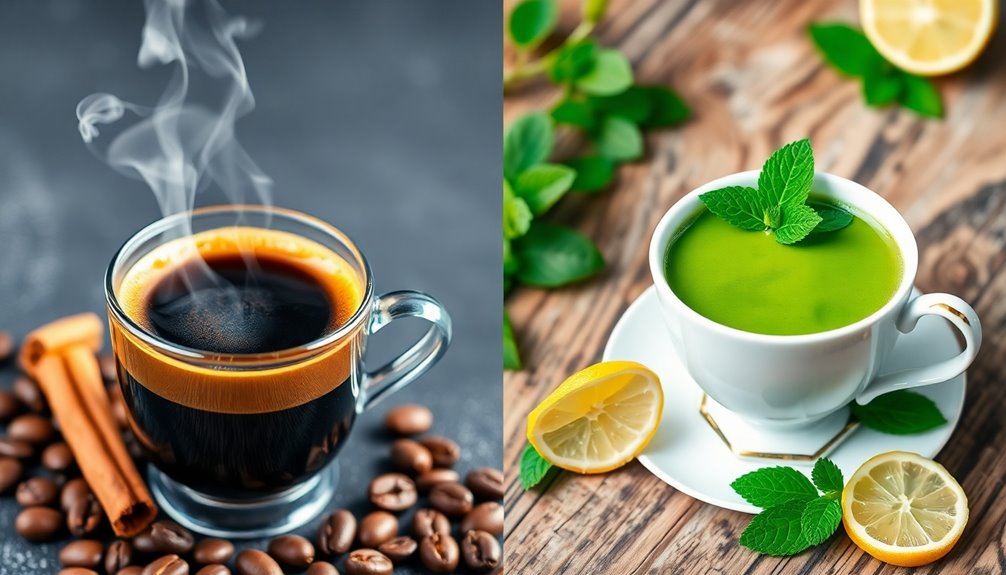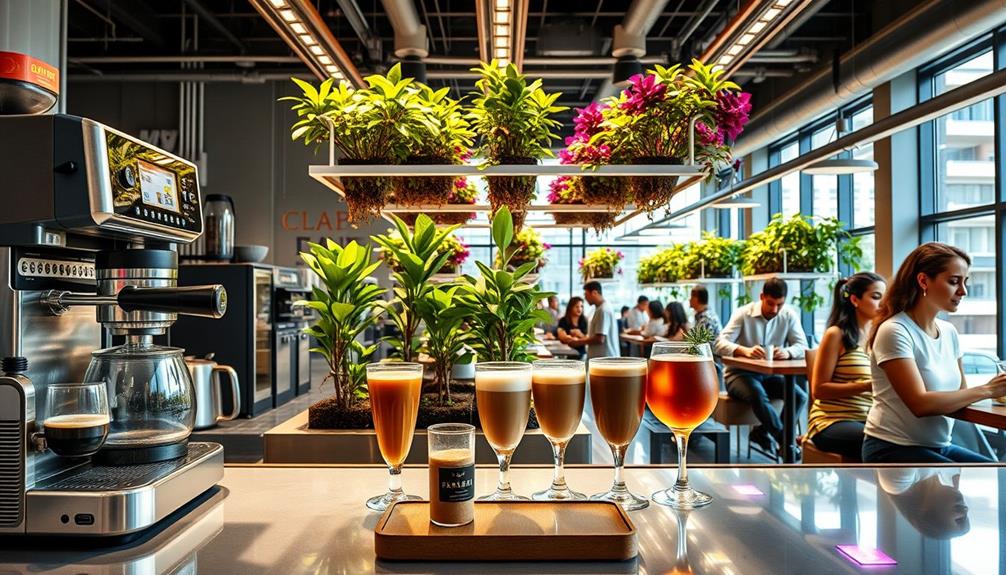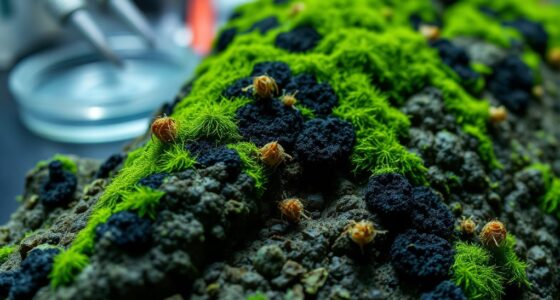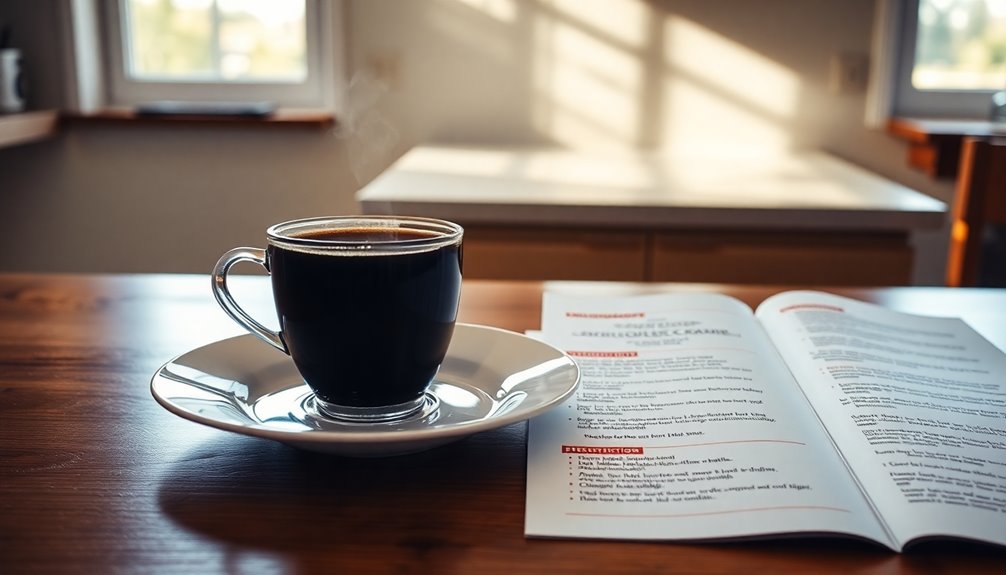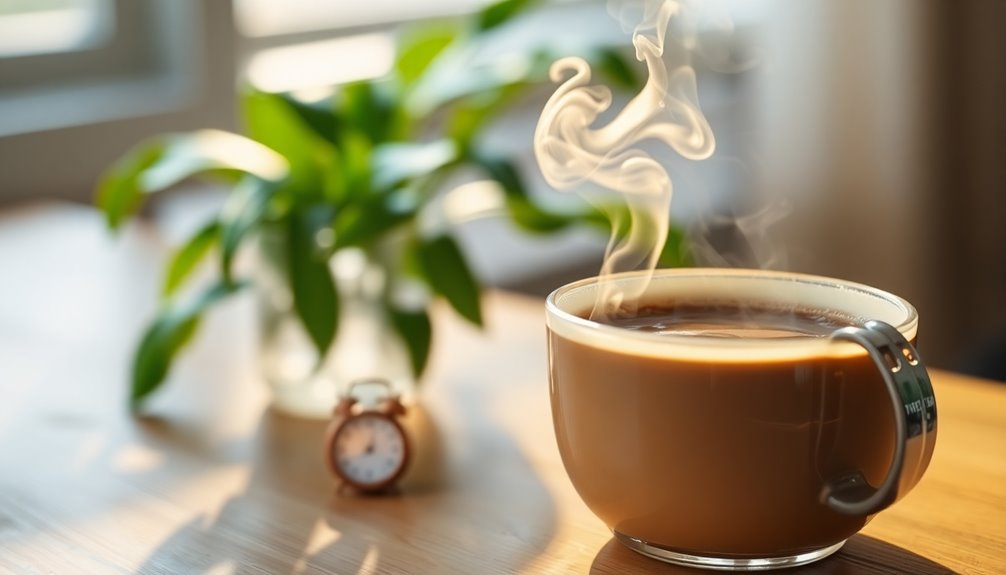When choosing between coffee and tea, you're looking at two beverages packed with benefits and some drawbacks. Coffee boosts cognitive function and lowers risks of Type 2 diabetes but can cause anxiety and sleep issues if overconsumed. On the other hand, tea improves heart health and aids in metabolism, though certain types may hinder iron absorption. Both drinks are rich in antioxidants, contributing to overall wellness. Your caffeine intake plays an essential role, as too much can disrupt sleep. If you're curious about how these factors affect your health day-to-day, there's much more to explore.
Key Takeaways
- Coffee consumption may lower the risk of Type 2 diabetes and improve cognitive function, while tea aids in blood pressure and cholesterol management.
- Both beverages are linked to increased longevity, with coffee reducing mortality risk by 30% and tea by 9-13%.
- Coffee is higher in caffeine than tea, which can affect sleep and cause anxiety in sensitive individuals.
- Antioxidants in coffee and tea combat inflammation and stress, promoting overall health benefits.
- Environmental impacts differ; coffee production can cause deforestation, while tea cultivation may lead to soil erosion and water depletion.
Health Benefits Overview
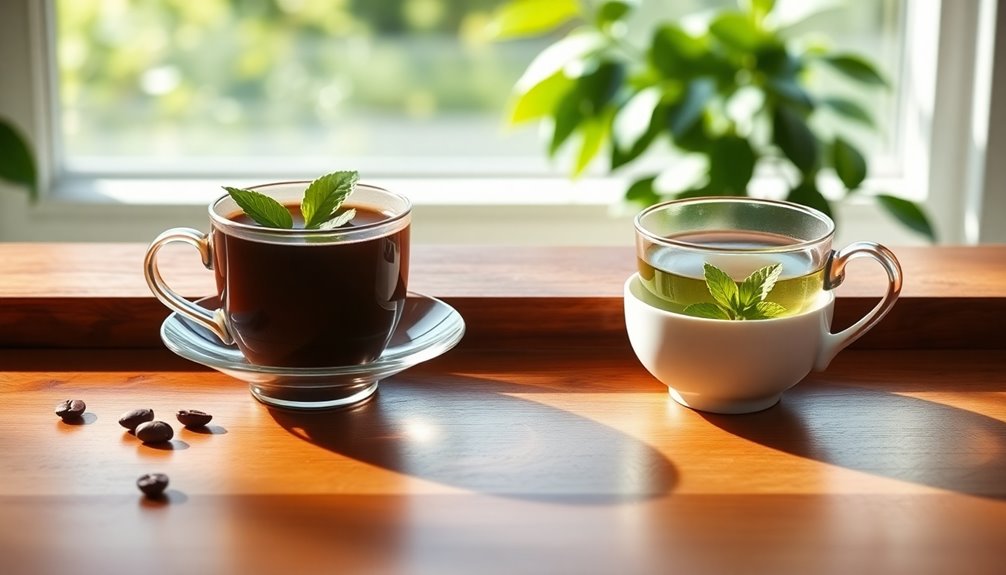
When you consider your daily beverage choices, both coffee and tea offer impressive health benefits that can greatly impact your well-being.
Research shows that regular coffee consumption is linked to a 25% lower risk of developing Type 2 diabetes and a 30% reduced likelihood of mortality.
On the other hand, tea drinkers enjoy improved blood pressure and cholesterol levels, which support heart health.
Both beverages are rich in antioxidants; coffee may protect against certain cancers, while tea's polyphenols fight inflammation and stress.
Additionally, coffee can lower the risks of dementia and stroke, whereas tea enhances mental clarity and reduces depressive symptoms. Moreover, coffee contains antioxidants that combat oxidative stress, contributing to overall health benefits.
Caffeine Content Comparison
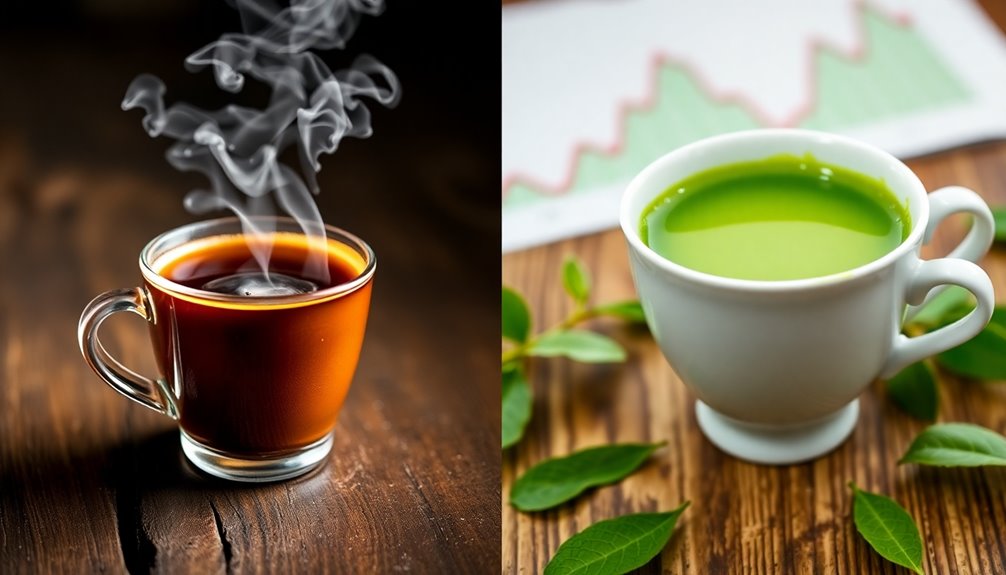
Both coffee and tea not only provide health benefits but also differ considerably in their caffeine content, which can influence your choice depending on your energy needs.
An 8-ounce cup of brewed coffee contains about 95 mg of caffeine, while black tea typically has around 47 mg. Cold brew coffee can pack even more caffeine, ranging from 155 to 215 mg per serving.
Green tea averages about 40 mg, with matcha reaching up to 60 mg. For most adults, the daily caffeine limit is 400 mg, roughly equivalent to 4 cups of coffee or 8 cups of black tea.
While coffee offers a quick energy boost, tea, particularly with L-theanine, provides a smoother increase, promoting relaxation without jitters.
Antioxidants in Coffee and Tea
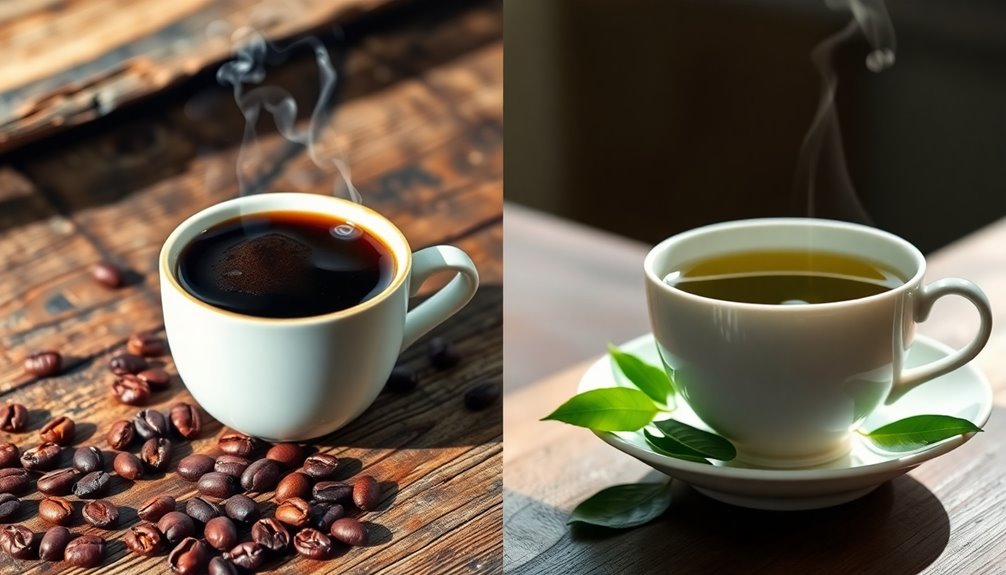
While many people savor their morning cup of coffee or tea, few realize the significant role antioxidants play in these beverages.
Coffee boasts over 1,000 bioactive compounds, including chlorogenic acid, which helps combat oxidative stress and reduce inflammation.
On the other hand, tea is abundant in epigallocatechin gallate (EGCG) and flavonols like quercetin and kaempferol, contributing to improved heart health and reducing the risk of chronic diseases.
Both drinks are effective at neutralizing free radicals, with coffee linked to a lower risk of certain cancers, while tea may protect against coronary artery disease. Regular consumption of these antioxidants can enhance your overall health, making both coffee and tea delicious options for boosting wellness. Additionally, incorporating air purification into your home can further improve health by reducing indoor pollutants that may counteract the benefits of these beverages.
Impact on Mental Focus
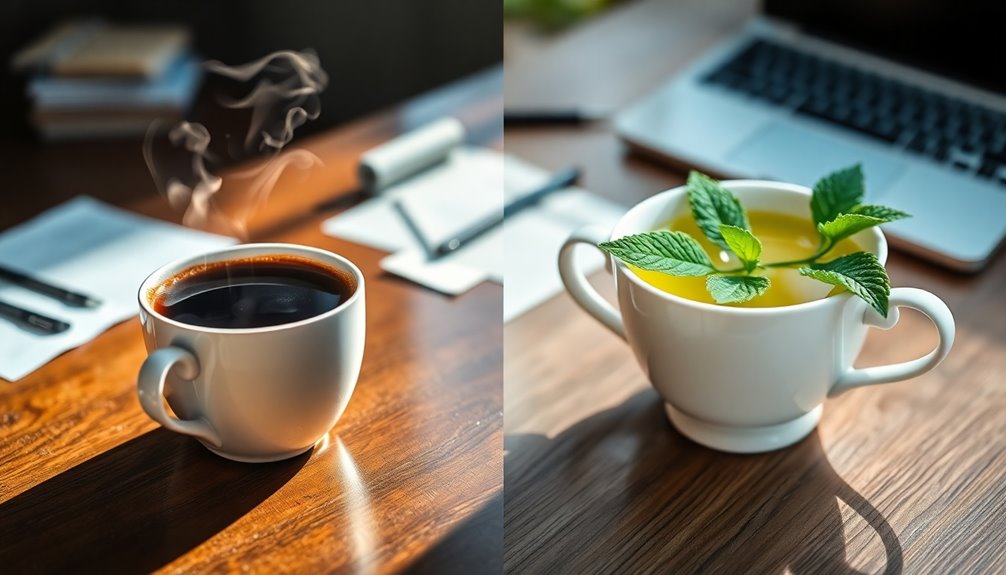
How do coffee and tea stack up when it comes to boosting your mental focus?
Coffee, with about 95 mg of caffeine per 8-ounce cup, provides a significant energy boost, enhancing attention span and mental alertness. This can be great for immediate cognitive function.
On the other hand, black tea offers around 50 mg of caffeine, delivering a milder lift without the jitters. Its L-theanine content promotes relaxation, potentially enhancing mental clarity.
Research shows that moderate coffee consumption can improve brain function and lower the risk of cognitive decline.
Meanwhile, tea's antioxidants may help reduce cognitive impairment.
Longevity and Mortality Rates
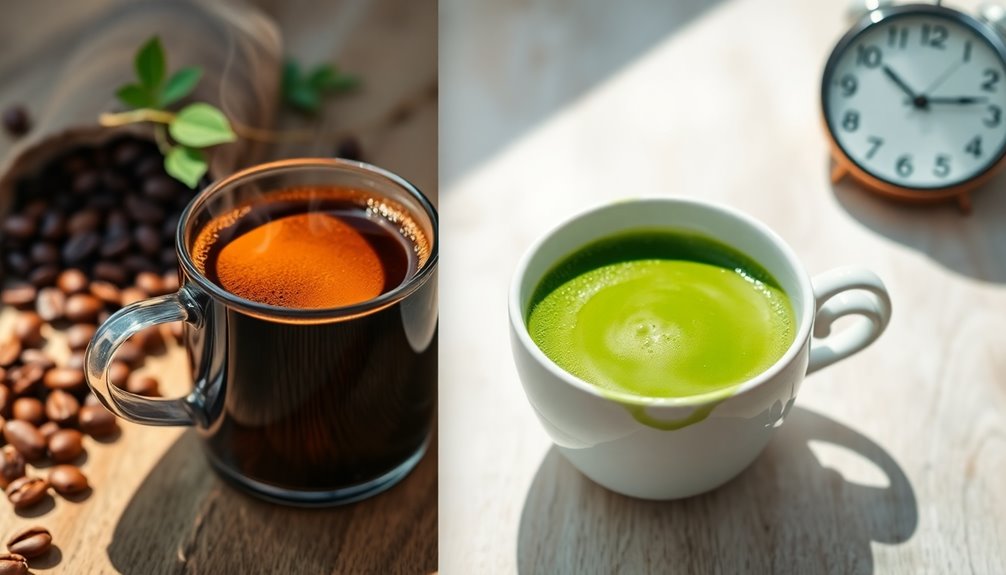
When considering longevity and mortality rates, coffee and tea emerge as two beverages that can positively influence your lifespan.
Regular consumption of coffee, around 2.5-4.5 cups daily, shows a 30% lower likelihood of dying, highlighting its health benefits.
Tea drinkers enjoy a 9-13% lower risk of mortality over 14 years, suggesting significant protective effects on overall health.
Observational studies indicate that the polyphenols in tea might reduce inflammation and stress, contributing to longevity.
Both beverages are linked to greater longevity compared to non-drinkers, reinforcing their combined benefits.
While coffee has more extensive research supporting its protective effects against chronic diseases, tea also plays an essential role in promoting a longer, healthier life.
Dietary Fiber Contributions
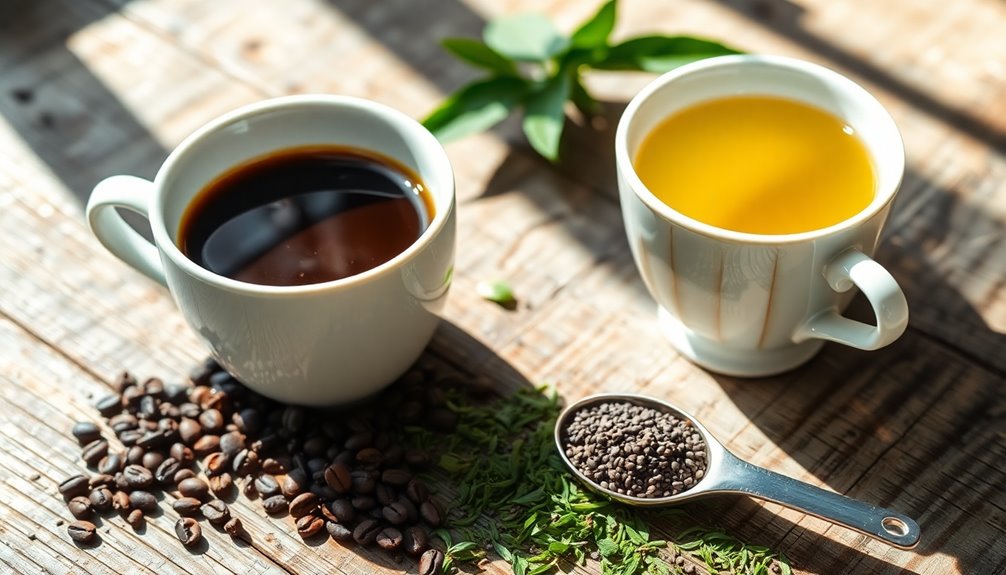
Although many people don't think of beverages as sources of dietary fiber, coffee and tea can play distinct roles in your daily intake. Brewed coffee contributes approximately 1.1 to 1.8 grams of fiber per 8-ounce cup, helping you meet your daily fiber intake recommendations. Consuming two to three cups can greatly aid in achieving the minimum daily goal of 25 grams. In contrast, tea generally lacks sufficient fiber unless the leaves are consumed, making coffee a more beneficial source for fiber intake. However, be cautious—excessive coffee consumption may lead to digestive issues that counteract its health benefits. Incorporating coffee into a balanced diet is ideal, while tea may require additional fiber sources.
| Beverage | Dietary Fiber Contribution |
|---|---|
| Coffee | 1.1 – 1.8 grams |
| Tea | Minimal unless leaves used |
Popularity and Global Trends

What drives the global divide between coffee and tea consumption? The answer lies in regional preferences and cultural habits. While tea reigns supreme worldwide, coffee dominates in the United States. Here are some key trends:
- In the U.S., 54% of adults enjoy daily coffee consumption, averaging three cups, while only 24.6% drink tea regularly.
- The United Kingdom showcases a strong tea culture, with 78.4% preferring it over coffee.
- China exhibits a staggering 98.9% tea consumption, with coffee being a rare choice.
Interestingly, young Americans are shifting beverage preferences, with tea consumption rising by 20% since 2000.
These trends reflect varying health benefits and cultural significance, influencing how you might choose your favorite beverage.
Consumption Guidelines and Tips
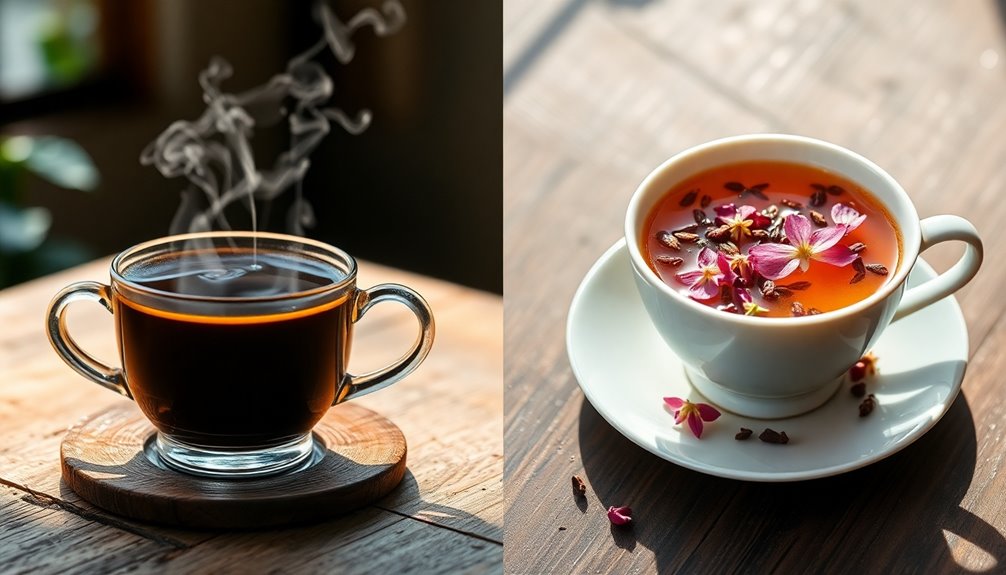
When it comes to enjoying coffee and tea, timing and caffeine intake matter.
Aim to drink coffee in the mid-morning for the best boost, and remember to monitor your caffeine consumption to stay within the recommended limits.
If you're pregnant, be extra cautious and keep your total caffeine below 200 mg a day.
Optimal Drinking Times
To maximize the health benefits of coffee and tea, timing your consumption is key. Here are some ideal drinking times to take into account:
- Mid-Morning Coffee: Enjoy brewed coffee between 9:30 AM and 11:30 AM when cortisol levels drop, enhancing its energizing effects.
- Tea Consumption Throughout the Day: Sip green or black tea for hydration and a moderate caffeine boost without disrupting sleep quality.
- Pre-Bedtime Herbal Teas: Avoid caffeine for at least six hours before bedtime; herbal teas are perfect for calming your mind. Additionally, staying mindful of hydration and nutrition can help maximize the benefits of both beverages throughout the day.
Caffeine Intake Recommendations
Caffeine intake can markedly impact your health, so knowing the right guidelines is crucial. The recommended daily caffeine limit for adults is less than 400 mg, roughly four cups of coffee or eight cups of black tea.
If you're pregnant, aim for less than 200 mg per day to minimize risks to the fetus. For ideal sleep quality, avoid caffeine consumption at least six hours before bedtime.
Everyone's different, so consider your personal caffeine sensitivity; some people may experience negative effects even with moderate intake.
Don't forget to account for all sources of caffeine, including chocolate and certain medications, to guarantee your total daily intake remains within recommended limits while still enjoying the health benefits of your favorite beverages.
Frequently Asked Questions
What Has More Health Benefits, Coffee or Tea?
When considering health benefits, both coffee and tea offer unique advantages.
Coffee's linked to a lower risk of Type 2 diabetes and certain cancers, while tea drinkers show reduced mortality rates.
You'll find that coffee boosts energy quickly due to its higher caffeine content, but tea provides a more gradual alertness, enhanced by L-theanine.
Ultimately, it depends on your preferences and health goals—each beverage has its own strengths worth exploring.
What Are the Disadvantages of Drinking Coffee or Tea?
Drinking coffee or tea can have its drawbacks. If you consume too much coffee, you might experience anxiety, insomnia, or digestive discomfort. Late coffee consumption can disrupt your sleep patterns, leaving you fatigued the next day.
On the other hand, tea can cause digestive issues for some, and its tannins may interfere with iron absorption. Both beverages can act as diuretics, so you need to balance them with plenty of water to stay hydrated.
What Are the Benefits as Well as Drawbacks From Caffeinated Drinks Such as Coffee and Tea?
Think of caffeinated drinks as a double-edged sword. They can sharpen your focus and boost your mood, but they can also lead to jitters and sleepless nights.
Coffee gives you an energetic kick, while tea offers a gentler lift. However, overindulgence in either can cause issues like anxiety or dependence.
Balancing your intake is key to enjoying the benefits without falling into the drawbacks that can overshadow your daily routine.
Is It Better to Not Drink Tea or Coffee?
Whether it's better not to drink tea or coffee really depends on your lifestyle and preferences.
If you enjoy them and consume them in moderation, you might reap health benefits like improved alertness and reduced risks of certain diseases.
However, if you're sensitive to caffeine or have issues like anxiety or insomnia, avoiding these drinks could be wise.
Ultimately, staying hydrated with water or milk is a great alternative that supports your overall well-being.
Conclusion
In the battle of coffee vs. tea, both beverages have unique perks and pitfalls. Think of them like two sides of a coin; each offers distinct health benefits that can enhance your daily routine. While coffee can kickstart your morning, tea might provide a calming afternoon pause. Ultimately, it’s about what fits best into your lifestyle and preferences. So, whether you sip a robust cup of coffee or a soothing mug of tea, enjoy the journey to better health! If you’re looking for a healthier alternative to your morning cup of joe, consider the many tea benefits for morning routine. With options like green tea, which is packed with antioxidants, or black tea, which provides a gentle caffeine boost, there are plenty of ways to start your day off on the right foot with a refreshing cup of tea. Plus, the ritual of brewing and sipping tea can be a calming and meditative way to ease into your day. So, don’t be afraid to switch up your morning routine and explore the benefits of tea for a healthier start to your day.
